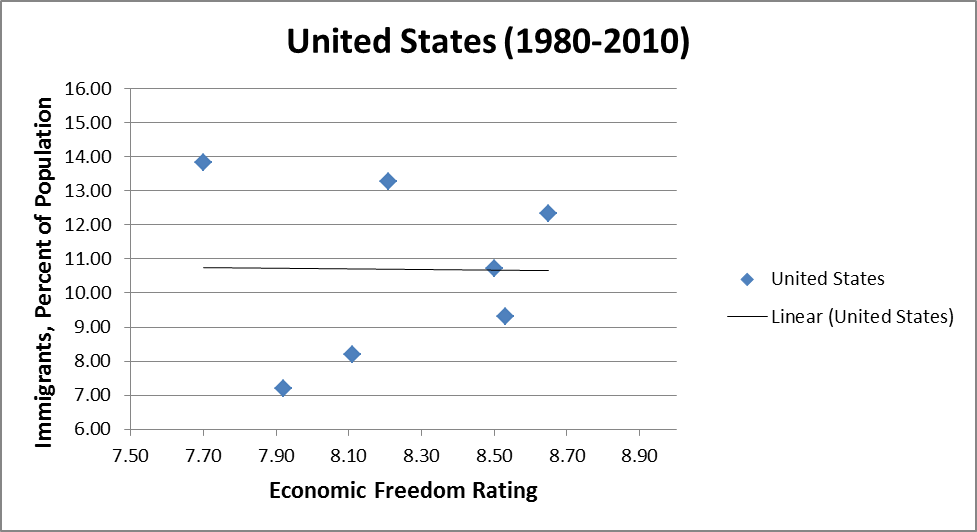Post by John Roccia (occasional blogger for the site, joined April 2013). See:
Well, let’s just cut right to the chase. On Tuesday, July 2nd, a guest blogger with the handle “Land of the Free” kicked the proverbial hornet’s nest here at Open Borders with a post titled Betting The Republic, and promised to reveal his/her secret identity after a week of debate.
It’s me!
Before the rotten tomatoes start flying, however, let me explain a few things. First, the views expressed by Land of the Free (or LOTF, for short) are not my views. Not even a little. Take a look at my past work here on Open Borders, and you’ll see that I’m as vehemently pro-open-borders as they come. When I wrote the two posts and the various comments as LOTF I was, to put it mildly, lying through my teeth. I wrote deliberate falsehoods about my identity and past work in order to throw you off the scent, and then I created an entirely false – but hopefully plausible-sounding – argument to present to you.
Why did I do all of this? I had two main motivators. The primary reason was as a form of social experimentation that Professor Bryan Caplan calls an “Ideological Turing Test.” A brief explanation of an ITT is this: if you can present an argument that is opposed to your own, and present it well enough that people can’t tell that you don’t actually hold those beliefs, you can be said to have “passed an Ideological Turing Test.” If you can’t pass an ITT, then chances are good that you don’t actually understand your opponent’s arguments, and are relying on straw men, being uncharitable, living in an echo chamber, or any other metaphors for poor debate technique. As to whether I think I actually passed the ITT, I’ll discuss that below.
Before I do that, I want to talk briefly about my other motivator. As far as arguments against open borders go, the issue of political externalities is the one I consider to be the strongest. I don’t agree with it, but I certainly think it’s more difficult to argue against than things like welfare drain or job-stealing, which are far more easily refuted. So in presenting this argument specifically, I wanted to draw out the very best of the counter-arguments – and you didn’t disappoint!
Michael Carey, Peter Hurley, David Bennion, Hansjorg Walther, (especially) Nathan Smith and several others presented excellent arguments – so excellent, in fact, that at a certain point I was actually unable to continue arguing the point. Some of my points were easier to refute than others (in fact, several of the points I made as part of my larger argument, such as the mention of IQ and the precautionary principle, I made to obscure my identity and leave false clues, rather than because they were especially good arguments). However, the entirety of this project was aimed towards challenging my fellow open-borders supporters to present their strongest case, and I felt the best way to do that was to present an actual antagonist to argue against.
What follows is a summary of the best arguments presented against LOTF’s main points. After that, I’ll add a few personal notes, as well as some thoughts about the ITT aspect.
- Assimilation effects are relatively large. Since the privilege of official political involvement is not automatic with immigration (nor does it have to be under open borders), by the time you are able to meaningfully influence politics, America will have largely changed and assimilated you. At least on average, America changes immigrants far more than immigrants change America.
- Additionally, even when they have the ability to vote or otherwise interact with the political process, immigrants as a group are not very involved.
- Founder effects, legacy institutions, and political structure all have much more influence on the politics of a nation than any single voting generation.
- Immigrants self-select for many traits very beneficial, and even under open borders, this effect would likely not vanish. Even with no institutional barriers to migration, migration is still difficult and those that choose to migrate often do so because they’re “voting with their feet” against the bad policies of their homeland.
- Lastly, even if immigrants were very heavily involved politically and voted in uniformly terrible ways, the American electorate is very elastic. Voter turnout is affected by many things, and one of those things could easily be great masses of immigrants voting in ways natives don’t like.
There is plenty of evidence to support those five positions – to start, look no further than the comments on “Betting the Republic!”
I would like to thank all of the commenters who engaged with me under my nom de plume; you made it an enjoyable and educational experience. I am filled with great confidence in the ability of the crew here to debate this topic well!
I would especially like to thank Vipul Naik, who was “in” on the whole charade, even planting a few strategic comments to challenge me further.
And I would like to apologize to Alexander Nowrasteh, who linked to “Betting the Republic” in a recent Cato blog post as an (as far as he knew, genuine) example of a political exernalities argument. The post, genuine or not, serves perfectly well in that role, so I hope he isn’t too upset at my ruse.
Now, lastly, I’d like to take a moment and talk about the actual Ideological Turing Test. I cannot rightly claim to have passed 100%. While none of the comments on “Betting the Republic” (or the other post responding to Bryan Caplan) indicated that anyone thought I wasn’t genuine (though several may have thought I was wrong or even foolish), the true test would have been if any restrictionists had supported me, rather than simply open-borders-advocates opposing me. If you imagine a typical Republican/Democrat debate, it would probably be far easier for a typical Republican to convince other Republicans that he was a Democrat than to convince actual Democrats that he was one of them. All our hypothetical Republican would have to do would be to play into the stereotypes his peers expected and they’d be unlikely to question his credentials – but other Democrats would more harshly judge someone who they thought wasn’t representing their views accurately.
In that sense, I did not necessarily pass the ITT. However, I would like to think that the group of people reading and commenting on “Betting the Republic” represents an above-average level of intellect and reason (to say the least). At least to some extent, convincing such a group that I was a restrictionist (a category of political viewpoint that this group in particular studies rather extensively) is enough to lead me to believe that I am accurately and charitably representing my opponents’ viewpoints. Since no restrictionists commented to support me, however, I can’t say for certain that I would be able to seamlessly pass as one of their own. So I’ll give myself a C+, but I can’t say I deserve an A.
However, this has been an enlightening and educational experience for me, and I want to sincerely thank everyone who participated. Now, answer in the comments: Did you think I was genuine (even if you didn’t think my argument was good)?


